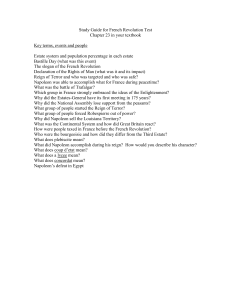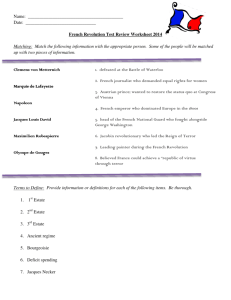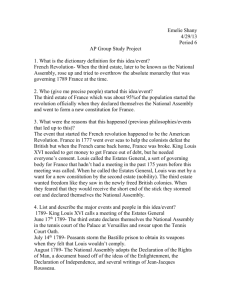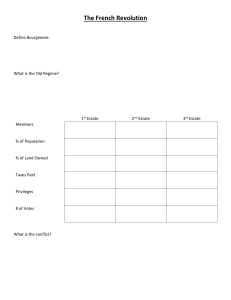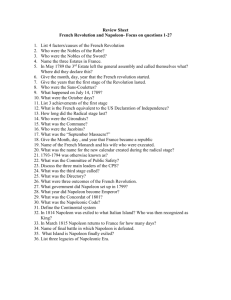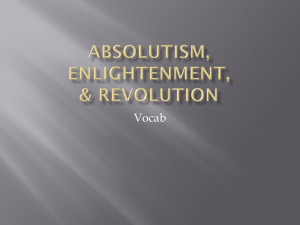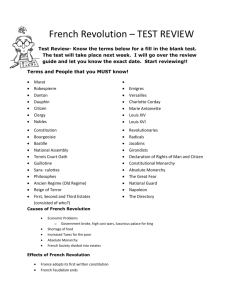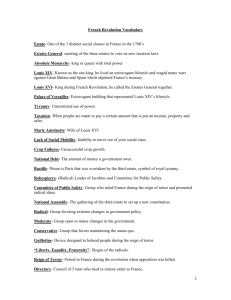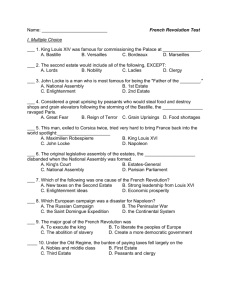File
advertisement
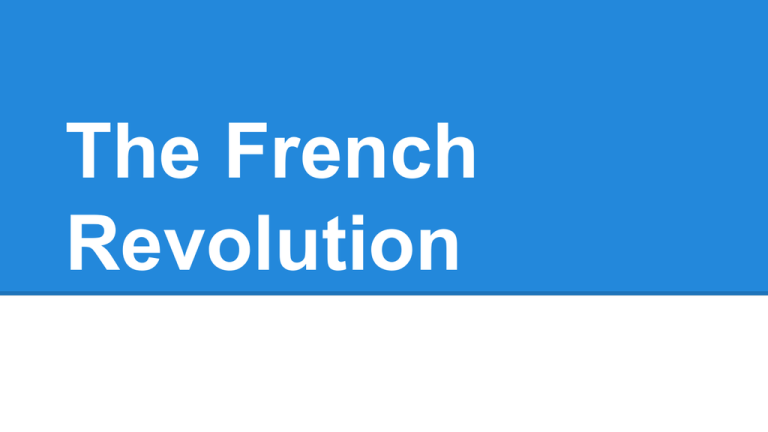
The French Revolution Old Regime Social System The French government was an absolute monarchy. France was divided into three classes, called the Estates The First Estate The Clergy (religious leaders). 1% of the population owned 10% of the land. Wealthy, owned land, and had special privileges. Paid no taxes. The Second Estate The Nobility Held the highest positions in the church, army, and the government. 2-5% of the population and owned 20% of the land. Had great wealth. Paid no taxes Third Estate Lawyers, craftsmen, merchants, and peasants 97% of the population Owned 65% of the land Paid all of the taxes to support the government and the church Had no voice in the government Political Causes French government had been an absolute monarchy for several hundred years. The king shared power with no one. The French parliament had not met in over 175 years! Majority of the people had few legal rights. There was no freedom of speech or press, and very little freedom of religion. People who were accused were considered guilty until they could prove their innocence. Economic Causes Gap between rich and poor widened. -Common people struggled to feed their families. By 1789, the French treasury was bankrupt due to 1. Foreign Wars 2. Previous national debt 3. Extravagant living at Versailles. Famine of 1788-89. -Bread was scarce and very expensive and the people of France were starving. Versailles https://www.youtube.com/watch?v=X235vpOTo VU#t=108 Size= ¼ of a mile! Cost is disputed by historians. Anywhere from 2 billion to 300 billion dollars. King Louis XVI (16) King of France during the revolution A person of mediocre intelligence Very indecisive and had trouble making big decisions. He and his wife Marie Antoinette lived a lavish lifestyle while the economy was in ruins. Marie Antoinette Married King Louis XVI when she was 15 years old. Daughter of the emperor of Austria Enjoyed spending money and living lavishly. Represented everything that was wrong with the monarchy. Nicknamed Madame Deficit Meeting of the Estate General Facing financial bankruptcy, King Louis XVI called a meeting of the Estates General to propose new taxes. All Estates agreed change was needed -Political reform -Address corruption Each Estate had one vote -3rd estate= 97% of population...1 vote -2nd estate= 2% of population..1 vote -1st estate= 1% of population.. 1 vote Third Estate The 3rd estate was always outvoted by the other two They demanded that voting now be conducted by the assembly as a whole, where each member would have one vote. The king rejected this proposal and the third estate walked out of the assembly in protest and formed the National Assembly The Tennis Court Oath On June 20, 1789 the delegates of the Third Estate were locked out of their meeting room by the King Louis XVI. The Third Estate delegates (National Assembly) then broke down a door to an indoor tennis court in the Palace of Versailles and took an oath to continue to meet there until they had drawn up a new constitution. Storming of the Bastille King Louis XVI began to fear an uprising of the people given the events at the meeting of the Estates General When he gave into the demands of the National Assembly he knew that he was weakening and feared a revolution. Bastille- July 14, 1789 The King no longer trusted his own troops (almost all of them were from the Third Estate) so he called in the Swiss troops to keep the peace in Paris. When the citizens saw the Swiss troops they panicked. They thought they were under attack and rushed to the French prison known as the Bastille to get gun powder for their weapons in order to defend Paris. While storming the Bastille, both the mayor of Paris and the governor of the Bastille were beheaded and killed. Declaration of the Rights of Man and Citizen August 4, 1789 the National Assembly met for a late night meeting They adopted a statement of revolutionary ideas. Intended as part of a transition from absolute monarchical rule to form a constitutional or representative government. Like the American Declaration, the French Declaration also appealed to Enlightenment principles like popular sovereignty, equal rights, and equal opportunity. Developed the slogan of their revolution- Life, Liberty and Fraternity The March on Versailles Neither the king nor the National Assembly had been able to deal with the problems of poverty and hunger. In October 1789, a Paris crowd led by thousands of women marched in the rain to Versailles. The women were angry about high food prices. The March on Versailles They also suspected that the king and queen, were plotting against the National Assembly. They stormed the palace, trapping the royal family. They demanded that Louis XVI and his family return with them to Paris, where they could be watched. To prevent violence, the king agreed. A limited Monarchy 1791-1792 The National Assembly created a limited Constitutional Monarchy. The Constitution of 1791: The new Constitution stripped the king of his power to a new assembly. The Legislative Assembly was created by the National Assembly to create new laws. This Legislative Assembly divided themselves into three groups. The extremes within the Legislative Assembly broke away. Factions within Legislative Assembly On the right side of the Legislative hall, sat the super-conservatives. These were members of the nobility/ clergy who wanted to see a return to a more powerful monarchy. Center of Legislative Hall In the center of the Legislative hall sat the moderates. They generally supported the constitutional monarchy, but were not necessarily allied with either side. Left side of the Legislative hall To the left of the center sat the liberal Girondists who believed the revolution had not gone far enough. They were working for a republic and an end to the monarchy. Far Left To the very far left sat the Jacobins. They were radical revolutionaries who embraced violence to achieve their goals of a republic. End of Special Privileges After the constitution was created, Church lands were seized, divided, and sold to peasants ⅔ of Church officials fled the country rather than swear allegiance to this. All tithes were eradicated. All special privileges of the First and Second Estates were abolished. War with Austria and Prussia Although King Louis had signed the Constitution, he entered into secret negotiations with the King of Prussia and Austria. Rulers of other neighbouring countries were worried about the revolution in France and feared their people would attack the king in the same way. The King Attempts to Escape France As the revolution continued to escalate, King Louis XVI began to fear for his life. On June 20, 1791 the King and his family dressed as peasants and attempted to flee France. They almost made it to the border when a common citizen recognized the king’s face. Both the King and Queen were thrown in jail for treason. Raise of the Jacobins A radical political group who wanted to abolish the monarchy and establish a republic. Jacobins seized power from the disorganized Legislative Assembly. They executed King Louis XVI for treason Named themselves the National Convention and established a republic. RECAP! 3rd Estate→National Assembly→Legislative Assembly→ National Convention Leader of the Jacobins Maximilien Robespierre Popular Lawyer Member of the National Assembly Ruthless in his efforts to bring about an “ideal” society. Lead France from 1793-1794. “Reign of Terror. Reign of Terror Robespierre’s rule in which thousands of people were killed becomes known as the Reign of Terror. 85% of those killed during the Terror were middle or lower class Many who were killed were former revolutionaries and allies of Robespierre Reign of Terror Revolutionary committees conduct hasty trials and issue thousands of death sentences to “traitors to the revolution.” Ordinary people were fearful because anyone and everyone can be denounced as a traitor to the Revolution and Beheaded. People start denouncing neighbors and others who they have a grudge against. End of the Terror Another change in government. Moderate leaders from “The Directory”. In July of 1794, Robespierre is arrested and executed via The Guillotine. Terror results in public opinion shifting away from radicals. The Directory Moderate leaders write new constitution. Two house legislature and 5 man directory restore order. Middle class and professional people are now the dominant force in government. Held power from 1795-1799 Napoleon Bonaparte Young, respected military general who was successful in many battles. Strong leader Believed that everyone was equal The people believed that Napoleon could bring stability to France after all the terror and chaos during the French Revolution. Believed in religious tolerance and equality. Crowned himself Emperor of France. Code Napoleon The Code dealt with law of persons, property and acquisition of property. This code forever swept away privilege and title of the wealthy French nobility and legalized freedom of religion. Achievements of Napoleon Created a National Bank. This allowed the government greater control of the economy and inflation. Established a system of public education. Schools were based on ability, not based on wealth or family connections. Tax Code- fairly distributed taxation and closed tax loopholes. Implemented a series of public works, including construction of new roads and a sewer system. Domination of Europe As a military man, Napoleon had a thirst for battlefield glory. Soundly defeated Austrian forces which gave Napoleon some Austrian territory and dissolving the Holy Roman Empire. Began the Peninsular War against Spain and Portugal in 1808 he captured the Spanish government. Napoleon Defeated Failed to defeat the British. Could not stop their navy. Placed an embargo on British goods but British Merchants engaged in smuggling and their products were well received in most nations controlled by Napoleon. Despite advice against it, Napoleon invaded Russia in June 1812. . Failure Russia used “scorched earth” tactics. Burned any supplies, food or livestock that might be used by the French. The French were forced to retreat out of Russia. The loss was devastating and was the beginning of the end for Napoleon. Began with 450,000 men and left with 40,000 men. After his defeat, Napoleon was exiled from Europe https://www.youtube.com/watch?v=lTTvKwCylF Y https://www.youtube.com/watch?v=wXsZbkt0y qo
